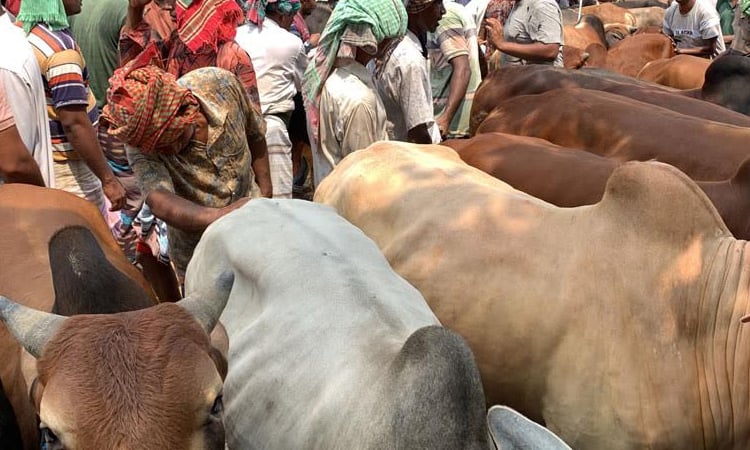News Flash
News Flash

By Md Aynal Haque
RAJSHAHI, May 26, 2025 (BSS)-The cattle markets have been witnessing plenty of supply of locally reared sacrificial animals following a remarkable boost in the local animal husbandry sector in recent years.
According to market sources, the buyers prefer locally reared healthier and hygienic cattle heads as sacrificial animals than the artificially fattened or extremely lower number of imported ones.
As a whole, the boosted-up native cattle production has been dominating the markets of sacrificial animals. In most of the cattle markets, the buyers were seen opting to purchase native animals.
The cattle markets are witnessing a record supply of sacrificial animals in the adjacent districts following a huge boost in the local animal husbandry sector in recent years.
As a result of house-to-house cattle, goat and sheep rearing practices, the division has become home to surplus sacrificial animals, counting to around 17 lakh in the division compared to its demand.
In the region, sacrificial animals, primarily cattle, including calves, bulls, buffaloes, goats, and sheep, are commonly sacrificed for Eid-ul-Azha. Cattle and goat rearing is widespread in the region, resulting in a large supply of sacrificial animals.
According to the latest official data, there are 43 lakh sacrificial animals compared to the demands of around 26 lakh in the division consisting of eight districts this year.
In both rural and urban areas, poor and marginalised people, including women, have achieved tremendous successes in the sector, getting various assistance from the government and development partners.
Artificial insemination of cows is gaining popularity in the region following significant achievements in improving the breeding system.
Abdur Razzaque, 45, a farmer of Charghat upazila, has fattened eight buffaloes for around seven months aimed at selling those in the upcoming sacrificial animal markets.
Due to the crossbreeding, the cows are giving milk 10 times more than the previous record, said Arafat Hossain, a successful dairy farmer in the city.
He said the producers have adopted new and improved practices and technologies in bull rearing and fattening, contributing to enhanced production and productivity.
The size of the market has expanded due to the growing active role of large and small-scale private companies.
Line agencies have become proactive towards supporting market actors, especially local service providers, by dint of their complementary roles in extension services.
Traders said there were plenty of supplies of cattle in the markets and their prices were similar to the last Eid-ul-Azha.
The price of an ideal-sized cow or buffalo starts from Tk 30,000 to 80,000 and a sheep or goat can be purchased from Tk 5,000 to 25,000 according to size.
In addition to the city's biggest cattle market-City haat, some temporary markets have been set up at Court Bazaar, Shaheb Bazaar Zero point, Railway Station, Court Station, Naodapara Aam Chattar and Kazla.
Dr Antim Kumar Sarker, divisional director of the Department of Livestock Services, told BSS that 302 hats consisting of 161 permanent and 141 makeshift ones were fixed for selling and purchasing sacrificial animals in the division.
All the hats are being supervised by medical teams. In each of the hats, hygiene management will be ensured. To this end, 213 veterinary medical teams were formed.
He said the Rajshahi district needs around four lakh animals to meet the demand for sacrifice, but it has around five and a half lakh animals eligible for the purpose.
Professor Jalal Uddin Sarder from the Department of Veterinary and Animal Sciences at Rajshahi University said that the venture promotes various value-addition activities of bull fattening, which reflect a sustainable economic change for the poorest people, particularly women.
Many of the rural families have been rearing and fattening bulls commercially and earning huge profits every year.
In the wake of the expansion of modern technology, the animal husbandry sector is flourishing in the areas boosting the local economy that reduces the import of sacrificial animals, he added.
Muhammad Abu Sufiyan, Commissioner of Rajshahi Metropolitan Police (RMP) told BSS that, all-out security measures were taken to check law and order in and around the cattle markets.
"Besides, we have introduced a special traffic management system to ease traffic congestion in and around cattle markets in the city," he added.
RMP installed temporary security camps at every cattle market here.
Besides, 'patrol teams and plainclothes police would also be deployed,' added RMP chief.
Necessary measures were also taken so that the cattle markets are not set up on roads and streets disrupting the vehicles' movement.
The Border Guard Bangladesh (BGB) has intensified vigilance against cattle smuggling along the Rajshahi frontiers to avert any sort of intrusion of cattle heads from the neighbouring country.
The BGB has increased patrolling in the bordering area to prevent the smuggling of cattle.